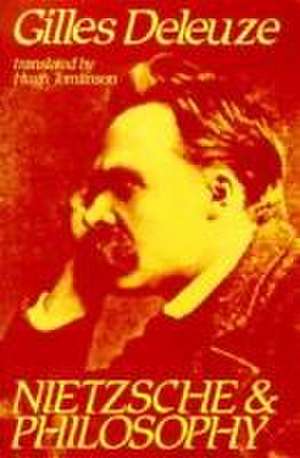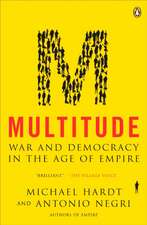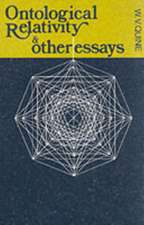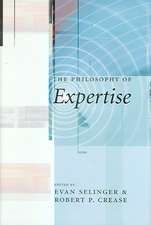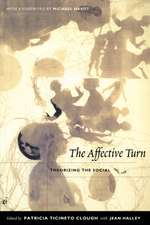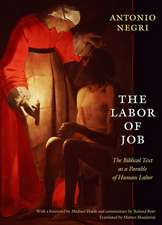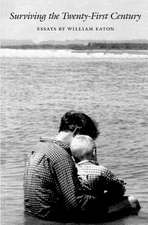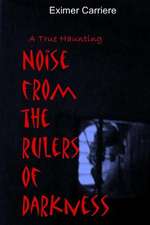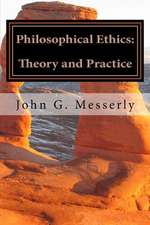Deleuze: Nietzsche & Philosophy (paper): Columbia Classics in Philosophy (COUP)
Autor Gilles Deleuze, Hugh Tomlinson, Michael Hardten Limba Engleză Paperback – 28 apr 1985
Preț: 139.80 lei
Nou
Puncte Express: 210
Preț estimativ în valută:
26.75€ • 28.61$ • 22.30£
26.75€ • 28.61$ • 22.30£
Carte disponibilă
Livrare economică 27 martie-10 aprilie
Preluare comenzi: 021 569.72.76
Specificații
ISBN-13: 9780231056694
ISBN-10: 0231056699
Pagini: 221
Dimensiuni: 136 x 209 x 15 mm
Greutate: 0.26 kg
Ediția:Reprint
Editura: Columbia University Press
Seria Columbia Classics in Philosophy (COUP)
ISBN-10: 0231056699
Pagini: 221
Dimensiuni: 136 x 209 x 15 mm
Greutate: 0.26 kg
Ediția:Reprint
Editura: Columbia University Press
Seria Columbia Classics in Philosophy (COUP)
Cuprins
Preface to the English Translation
Translator's Notes
Abbreviations of Nietzsche's Works
The Tragic
The Concept of Genealogy
Sense
The Philosophy of the Will
Against the Dialectic
The Problem of Tragedy
Nietzsche's Evolution
Dionysus and Christ
The Essence of the Tragic
The Problem of Existence
Existence and Innocence
The Dicethrow
Consequences for the Eternal Return
Nietzsche's Symbolism
Nietzsche and Mallarme
Tragic Thought
The Touchstone
Active and Reactive
The Body
The Distinction of Forces
Quantity and Quality
Nietzsche and Science
First Aspect of the Eternal Return: as cosmological and physical doctrine
What is the Will to Power
Nietzsche's Terminology
Origin and Inverted Image
The Problem of the Measure of Forces
Hierarchy
Will to Power and Feeling of Power
The Becoming-Reactive of Forces
Ambivalence of Sense and of Values
Second Aspect of the Eternal Return: as ethical and selective thought
The Problem of the Eternal Return
Critique
Transformation of the Sciences of Man
The Form of the Question in Nietzsche
Nietzsche's Method
Against his Predecessors
Against Pessimism and against Shopenhauer
Principles for the Philosophy of the Will
Plan of The Genealogy of Morals
Nietzsche and Kant from the Point of View of Principles
Realisation of Critique
Nietzsche and Kant from the Point of View of Consequences
The Concept of Truth
Knowledge, Morality and Religion
Thought and Life
Art
New Image of Thought
From Ressentiment to the Bad Conscience
Reaction and Ressentiment
Principle and Ressentiment
Typology and Ressentiment
Characteristics of Ressentiment
Is he Good? Is he Evil?
The Paralogism
Development of Ressentiment: the Judaic priest
Bad Conscience and Interiority
The Problem of Pain
Development of Bad Conscience: The Christian priest
Culture Considered from the Prehistoric Point of View
Culture Considered from the Post-Historic Point of View
Culture Considered from the Historical Point of View
Bad Conscience, Responsibility, Guilt
The Ascetic Ideal and the Essence of Religion
Triumph of Reactive Forces
The Overman: Against the Dialectic
Nihilism
Analysis of Pity
God is Dead
Against Hegelianism
The Avatars of the Dialectic
Nietzsche and the Dialectic
Theory of the Higher Man
Is Man Essentially "Reactive"?
Nihilism and Transmutation: the focal point
Affirmation and Negation
The Sense of Affirmation
The Double Affirmation: Ariadne
Dionysus and Zarathustra
Conclusion
Notes
Translator's Notes
Abbreviations of Nietzsche's Works
The Tragic
The Concept of Genealogy
Sense
The Philosophy of the Will
Against the Dialectic
The Problem of Tragedy
Nietzsche's Evolution
Dionysus and Christ
The Essence of the Tragic
The Problem of Existence
Existence and Innocence
The Dicethrow
Consequences for the Eternal Return
Nietzsche's Symbolism
Nietzsche and Mallarme
Tragic Thought
The Touchstone
Active and Reactive
The Body
The Distinction of Forces
Quantity and Quality
Nietzsche and Science
First Aspect of the Eternal Return: as cosmological and physical doctrine
What is the Will to Power
Nietzsche's Terminology
Origin and Inverted Image
The Problem of the Measure of Forces
Hierarchy
Will to Power and Feeling of Power
The Becoming-Reactive of Forces
Ambivalence of Sense and of Values
Second Aspect of the Eternal Return: as ethical and selective thought
The Problem of the Eternal Return
Critique
Transformation of the Sciences of Man
The Form of the Question in Nietzsche
Nietzsche's Method
Against his Predecessors
Against Pessimism and against Shopenhauer
Principles for the Philosophy of the Will
Plan of The Genealogy of Morals
Nietzsche and Kant from the Point of View of Principles
Realisation of Critique
Nietzsche and Kant from the Point of View of Consequences
The Concept of Truth
Knowledge, Morality and Religion
Thought and Life
Art
New Image of Thought
From Ressentiment to the Bad Conscience
Reaction and Ressentiment
Principle and Ressentiment
Typology and Ressentiment
Characteristics of Ressentiment
Is he Good? Is he Evil?
The Paralogism
Development of Ressentiment: the Judaic priest
Bad Conscience and Interiority
The Problem of Pain
Development of Bad Conscience: The Christian priest
Culture Considered from the Prehistoric Point of View
Culture Considered from the Post-Historic Point of View
Culture Considered from the Historical Point of View
Bad Conscience, Responsibility, Guilt
The Ascetic Ideal and the Essence of Religion
Triumph of Reactive Forces
The Overman: Against the Dialectic
Nihilism
Analysis of Pity
God is Dead
Against Hegelianism
The Avatars of the Dialectic
Nietzsche and the Dialectic
Theory of the Higher Man
Is Man Essentially "Reactive"?
Nihilism and Transmutation: the focal point
Affirmation and Negation
The Sense of Affirmation
The Double Affirmation: Ariadne
Dionysus and Zarathustra
Conclusion
Notes
